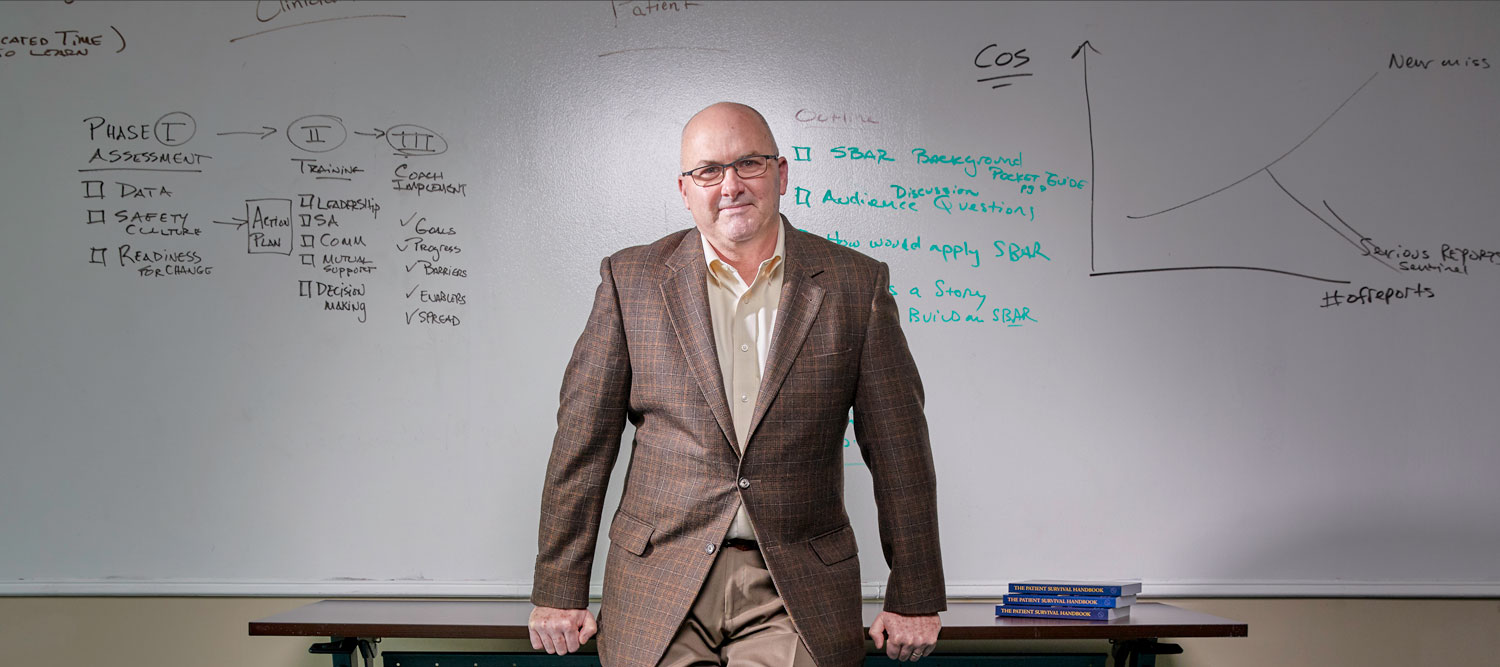Imagine a Boeing 777 crashing every day, with no survivors. In 1999, that’s how Steve Powell (’08) visualized the estimated 98,000 Americans who died each year due to medical errors, according to a report in that same year from the Institute of Medicine (IOM).
Around that time, Powell was by his father’s side for two years of treatments, procedures and hospital stays in a struggle against lung cancer. That struggle ended suddenly in 2002 — after a routine treatment went wrong. His father’s death was emblematic of the common, preventable medical errors outlined in the IOM report, and Powell was determined to change it.
“What I saw was a really broken system,” Powell says, “where there was very little coordination, little cohesiveness between the care teams, little cooperation, communication — all the ‘C’ words were just not there. You weren’t the quarterback, you were the football, and you were getting kicked around from one place to another with no one in charge.”
Powell considers the IOM report a seminal industry moment, in the same way that fatal airline accidents led to crew resource management (CRM) training starting in the early ’80s. With nearly two decades of safety and flight experience in the U.S. Navy and Delta Air Lines, surviving his father spurred him to look beyond aviation to see if he could apply his experience to the world of healthcare.
Mission Readiness Model
While still working as a pilot at Delta, Powell opened his medical training and consulting business, Synensys, in 2004 and began pursuing a master’s degree in human factors from Embry-Riddle’s Worldwide Campus in Atlanta.
Powell looked to a high-reliability organization in a high-risk environment for a model to apply to healthcare. “How could someplace that’s so dangerous — an aircraft carrier flight deck — be so safe, when the average age of a person working the flight deck is 19 years old? Very few have advanced degrees and programming. And yet they recover and launch airplanes 24/7, all over the world,” Powell says. “It comes down to mission readiness.”
Synensys found a kindred spirit in the military medical system, where it earned some of its first contracts. “They could see the readiness benefits right away,” Powell says.
Applied Aviation Science
Seeing the evolution of aviation error management gave Powell perspective on the healthcare industry.
“What’s interesting is that the same factors that were causing aircraft accidents prior to CRM were causing medical errors as well, with communication being No. 1. You can’t take away the root causes, but training can mitigate and manage them.”
While still at Embry-Riddle, Powell’s graduate studies helped expand his product offerings. “I took electives on learning science, learning technology and training. The degree wasn’t just human factors; it was everything that I needed to develop a portfolio of services for our clients.”
By 2010, Synensys had a comprehensive safety software solution and training programs available in English, Japanese and Arabic. It also had an office in Qatar.
But Powell says, “The elephant in the room is that the same mandate that’s there for aviation isn’t there for healthcare.” To “sell” safety, he has to appeal to the industry from a cost basis. “You have to reach for things like, how much it might cost the hospital if there’s a malpractice claim. We use that to incentivize healthcare organizations to do CRM, implement a safety culture and perform safety audits.”
In 2015, Powell took his knowledge to consumers. He co-authored The Patient Survival Handbook, a book that promotes patient awareness and self-advocacy to prevent medical mishaps.
Now in his 28th year as a pilot at Delta and his 15th year as CEO of Synensys, Powell is still honing his craft. “I’m just finishing up a Ph.D. program in healthcare administration. It’s helping me better understand healthcare leadership and move our organization into its next season,” he says.
